What are the best sweeteners for the keto diet? Check out this comprehensive guide to baking with sugar substitutes, and learn how to get the taste and texture you crave!
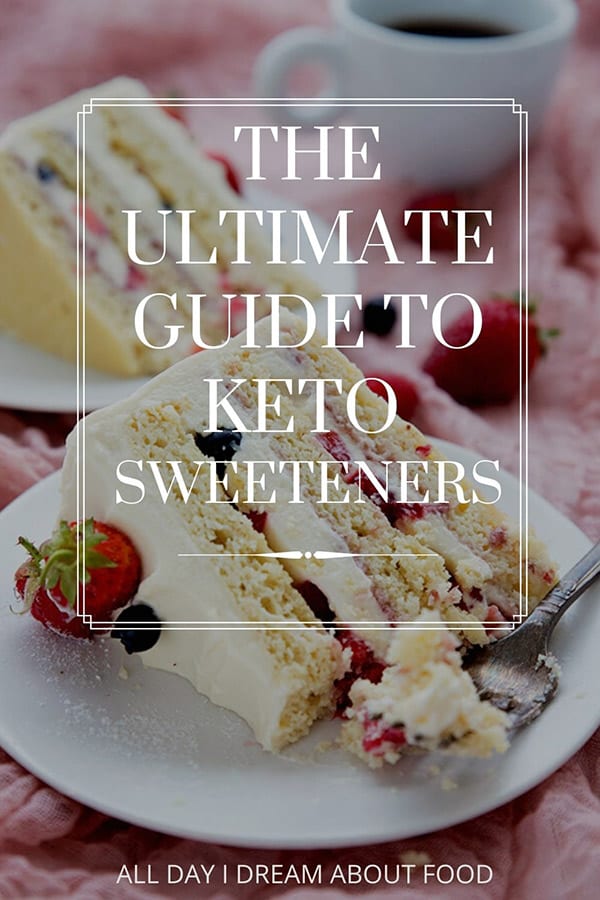
Today, my keto friends, I am imparting some of my vital knowledge and deep wisdom about using keto sweeteners. We will discuss all of their pros and cons, and how they affect the outcome of your keto desserts.
In advance of the holiday baking season, I figured you could put this information to good use. Because if you’re anything like me, you like to get an early jump on your keto holiday cookies!
This is actually an abridged version of the in-depth keto sweetener section in my book, The Ultimate Guide to Keto Baking. I think you will find it very informative.

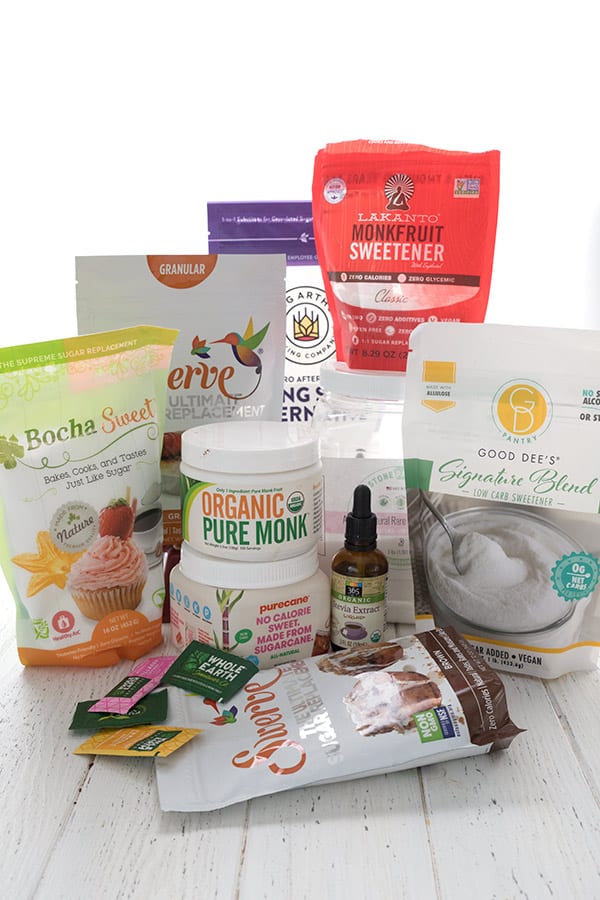
What is the best keto sweetener?
I’m sorry, I simply cannot answer that for you.
I’m not being willful or stubborn, or deliberately withholding information. It’s simply that there is no such thing. Yes, you read that right – there is no such thing as the best keto sweetener.
Here’s why: Everyone experiences these sugar substitutes differently. It’s almost as individual as the individual themselves.
- Some people experience an unpleasant aftertaste with one and not another.
- Some people suffer from GI issues or headaches when consuming certain sweeteners.
- Some people see a blood sugar rise when other people do not.
- Some people may even experience an allergic reaction to certain sweeteners.
With the sugar substitutes market constantly expanding and changing, it’s much more about finding what sweeteners work best FOR YOU.
What are the best sweeteners for keto baking?
Ah, now we’re on to something. This is my territory and one that I have researched extensively. I have experimented with a wide array of sugar substitutes and I can tell you straight up that none of them behaves exactly like sugar.
They all have very different properties and the sweetener(s) you choose will impact the outcome of your recipes. The trick is to understand their different attributes and use them to advantage.
Consider the final product before choosing your sugar substitutes. What are you trying to make? What consistency are you trying to achieve? Do you want it crisp or soft? Chewy or cakey? Should it be gooey or firm?
Most of the popular brands on the market are actually blends of two or more keto sweeteners. For simplicity’s sake, I am going to break them down into their main ingredients.
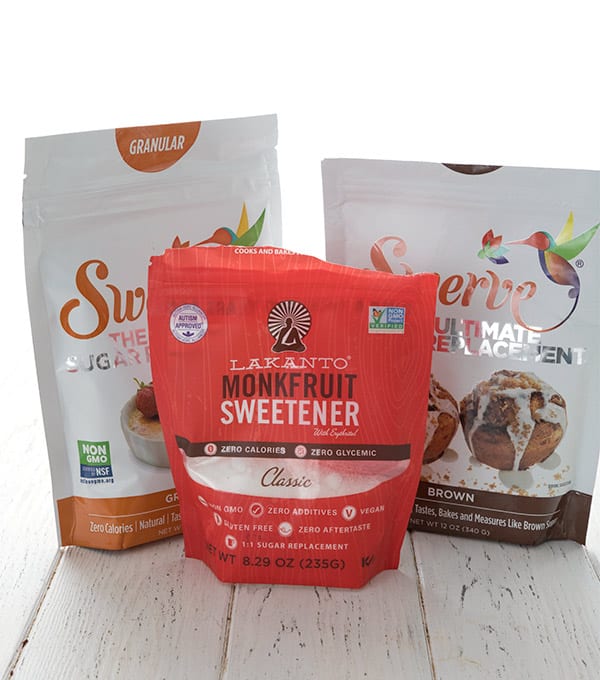
Erythritol
What is it?
Erythritol is a sugar alcohol (polyol) that is naturally present in some fruits and fermented foods. For mass production, it is made by fermenting a glucose syrup with enzymes.
It is unique among sugar alcohols in that it has zero carb impact. Our bodies simply do not recognize it as a carb so it does not impact blood sugar at all. And unlike many sugar alcohols, it does not cause gastrointestinal issues for most people.
How does it work?
Similar to sugar:
– Erythritol mimics sugar in its crystalline structure, so it helps whip air into butter and egg whites.
– It also browns and crisps up nicely and it can even be coaxed into caramelizing.
Differs from sugar:
– It’s only 70% as sweet as sugar, which is why most brands combine it with other sweeteners, to make it measure cup for cup.
– It’s non-hygroscopic, meaning that unlike sugar, it does not attract or hold onto moisture, which can cause baked goods to be dry and crumbly if they don’t have enough fat.
– It can re-crystallize as it cools, particularly in liquid applications like sauces, custards, and ice cream.
– Some people experience a mouth-cooling sensation, similar to sucking on a mint. Not everyone experiences this, and often mixing it with other sweeteners eliminates this sensation.
Major Brand Names: Swerve, Lakanto (this is mostly erythritol… do not be fooled by the fact that it calls itself a “monk fruit sweetener”), So Nourished, ZSweet.
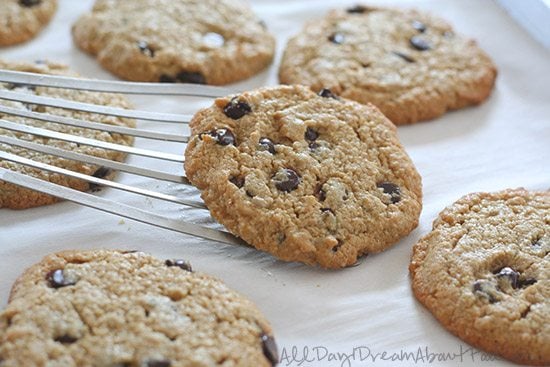
Xylitol
What is it?
Xylitol is also a sugar alcohol found in some fruits and vegetables, as well as in wood and corn. It is usually manufactured commercially from corn or birch trees.
Some, but not all, xylitol is absorbed by the intestines into the bloodstream. This means it can cause some gastrointestinal discomfort when consumed in large amounts. It can also have an impact on blood sugar.
WARNING! The biggest issue with xylitol is that it is highly toxic to dogs.
How does it work?
Similar to sugar:
– It has a crystalline structure so it can whip air bubbles into butter and egg whites. It’s also as sweet as sugar.
– It’s more hygroscopic than erythritol so it attracts moisture and it doesn’t re-crystallize as it cools. Xylitol is great for ice creams and sauces to keep them soft.
Differs from sugar:
– Xylitol doesn’t caramelize or crisp up very well. This can cause problems for baked goods that need a crisp texture, like many keto cookies. They will turn out much more cakey and soft if you use xylitol.
– Definitely do NOT use for meringue, as it will stay gooey and soft, and won’t come off the parchment paper.
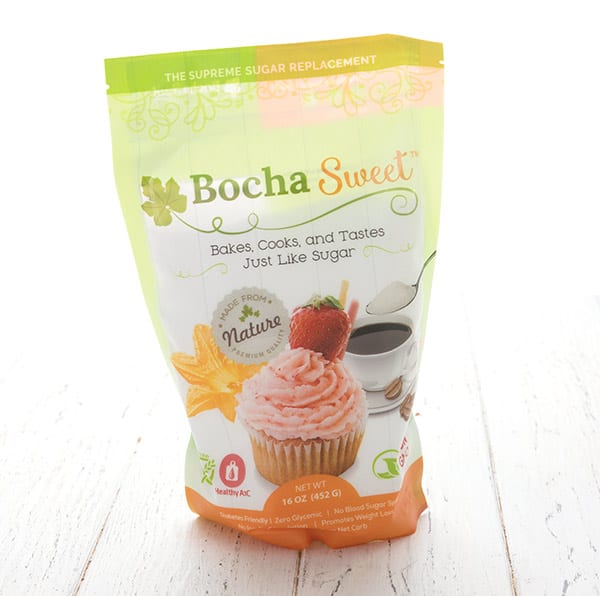
BochaSweet
What is it?
BochaSweet is the brand name of a unique sweetener derived from the kabocha squash, a type of winter squash also know as Japanese pumpkin.
Like erythritol, it seems to have little to no impact on most people’s blood sugar. But like xylitol, it can cause some gastrointestinal upset when consumed in large quantities.
In many ways, BochaSweet functions a lot like xylitol (they are both pentose sweeteners), but it does not appear to be toxic to household pets.
How does it work?
Similar to sugar:
– BochaSweet is as sweet as sugar and so can be used as a cup-for-cup replacement, without an apparent aftertaste.
– It is more hygroscopic and doesn’t re-crystallize so it’s great in sauces, custards, and ice creams. (I have started using it in combination with Swerve in all of my keto ice cream… they stay scoopable even straight from the freezer!).
Differs from sugar:
– Just like xylitol, BochaSweet will not crisp up or brown very well. Cookies end up soft and cakey, and meringues are so gooey that they won’t come off the paper.
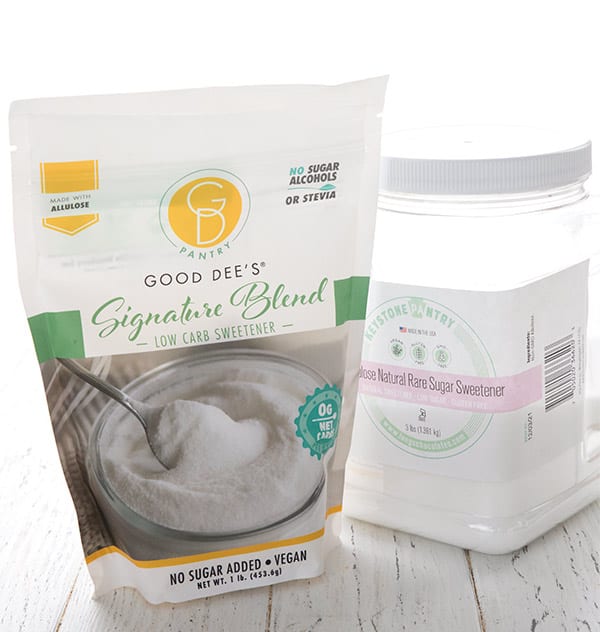
Allulose
What is it?
Allulose is a relative newcomer on the sugar alternative scene and has become incredibly popular. It is a monosaccharide, which means it really is a “sugar”, but one that our bodies don’t treat like a sugar or a carb. It is largely excreted without ever affecting blood glucose levels.
However, I caution you from personal experience that large amounts can cause serious GI distress. Many people don’t seem to suffer from this, but some of us do and it’s…not fun.
So it’s worth testing on yourself in small amounts and building up from there.
How does it work?
Similar to sugar:
– Allulose caramelizes nicely and tends to be hygroscopic, keeping sauces and ice creams soft, and baked goods tender.
Differs from sugar:
– Allulose is only 70% as sweet, which means you need more to sweeten your desserts.
– While it caramelizes well, it doesn’t crisp up well and baked goods tend to be soft and cakey. Even just a little allulose, in combination with other sweeteners, can prevent your cookies from becoming crisp.
– It can over-brown the outside of baked goods, especially the parts that are touching the sides of the pan. Cakes can have a dark, almost burnt appearance, although they aren’t over-cooked.
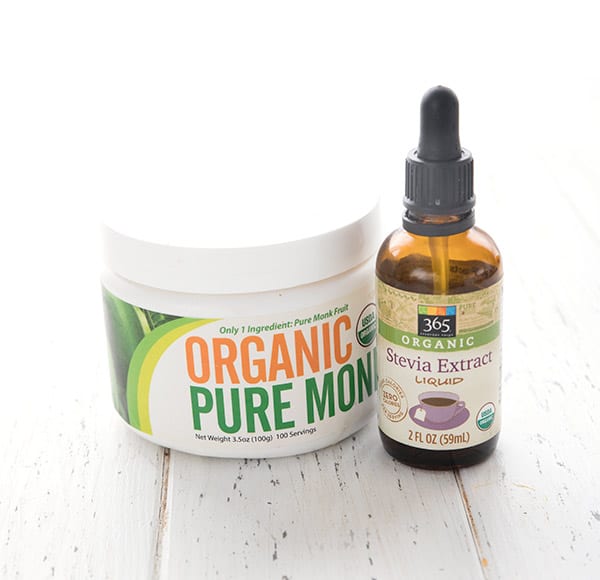
Stevia and Monk Fruit
I am lumping these two together because they have many similar properties and behave much the same way.
What are they?
Both stevia and monkfruit are naturally derived, plant-based sweeteners that are hundreds of times sweeter than sugar. Because they are extremely concentrated, a tiny amount can sweeten a whole recipe.
While that may sound like a good thing, it can have major implications for your keto baked goods. Read on…
How do they work?
Concentrated sweeteners like these have no “bulk” – they have little in the way of weight or volume so they don’t add much to your recipe other than sweetness. They can’t contribute anything to texture or consistency, and they don’t caramelize, crisp, or brown your baked goods.
Bulk is an important factor in anything from cupcakes to frosting. Substituting a non-bulk sweetener means your keto treats may not rise properly, may be more fragile, and may not set properly.
“Monk fruit sweetener”
Please be aware that many brands that bill themselves as “monk fruit sweetener” are actually mostly erythritol. The main ingredient is erythritol, with a little monk fruit to make it sweeter. This means that the sweetener will behave mostly like erythritol.
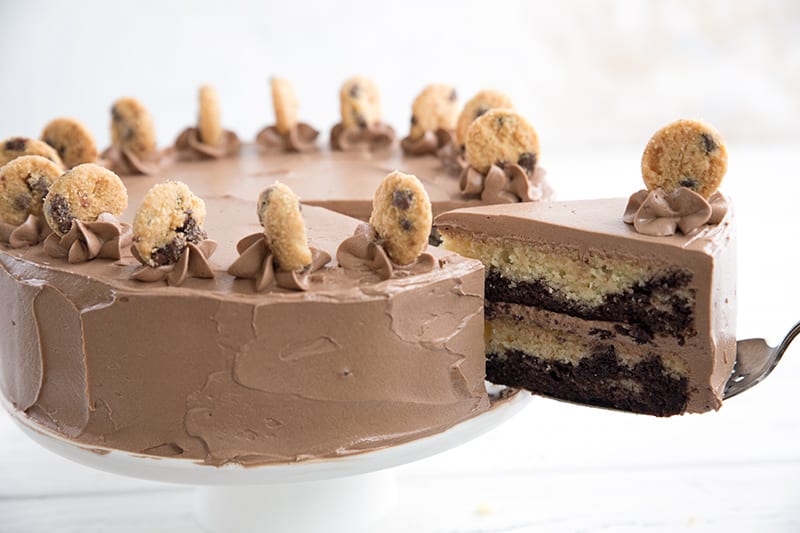
How to use sugar substitutes
I’ve thrown a ton of information at you and I know it’s hard to digest it all. I do this for a living and still I have times when a certain sweetener doesn’t behave the way I think it should. But here’s a quick cheat sheet on what to use when:
Want crisp keto cookies? Use erythritol based sweeteners like Swerve, Lakanto, or So Nourished. Other options will make your cookies soft and cakey. I highly recommend Swerve Brown for the best brown sugar substitute for cookies!
Making a keto cake recipe? Use any sweetener that has bulk (erythritol, BochaSweet, xylitol or allulose), but do be forewarned that some are not quite as sweet as sugar and you may need more of them.
Making a keto frosting? You need a bulk powdered sweetener to give your frosting structure. Erythritol, xylitol, and BochaSweet all have confectioners (powdered) versions. Allulose may as well but I am unsure of brands.
Want a gooey consistency? Try using BochaSweet or allulose, or combine it with another erythritol based sweetener. This combo is perfect for things like keto caramel sauce or my keto pecan pie.
Want keto ice cream that stays scoopable for days? My recommendation is half Swerve and half BochaSweet or allulose. Using only erythritol based sweeteners makes your ice cream rock hard, and all BochaSweet makes it too soft (it stays like soft serve!).
Just trying to sweeten your coffee? Use whatever you like best. They all work well if you don’t need a certain consistency so this is a matter of personal preference.
Still have questions?
Leave a comment and I will do my best to answer!
Adding to the confusion is that many brands on the market are blends of the keto sweeteners I outlined above. Blending sugar substitutes can maximize their sweetness and reduce potential aftertastes.
But I’ve tried such a wide array of sweeteners, I have a good idea of how most of them work. I can also take an educated guess based on the ingredients list. So drop me a line and I will give you all the information I can.

Free Bonus: Secrets to Keto Baking!
Sign up for your favorite recipes delivered straight to your inbox plus get our FREE bonus: Secrets to Keto Baking!


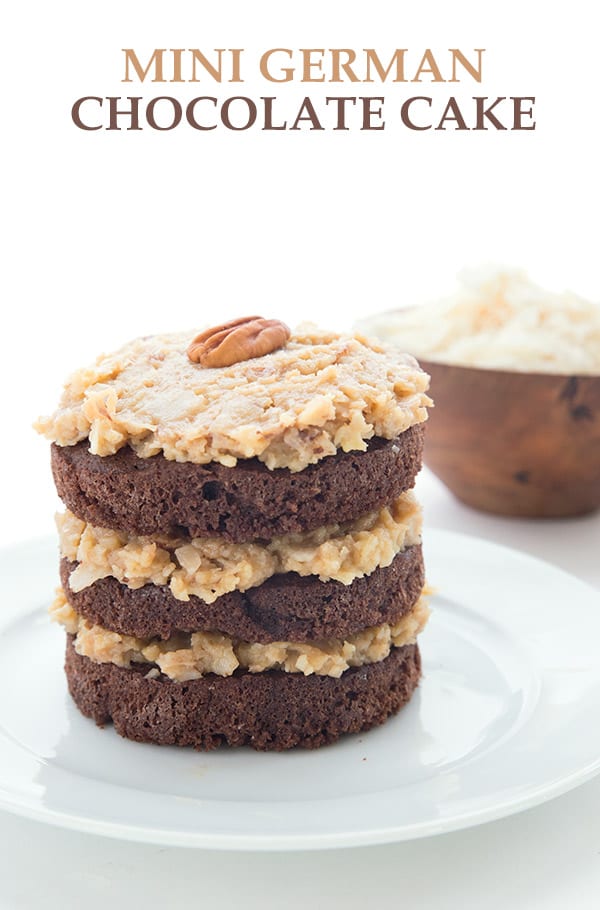
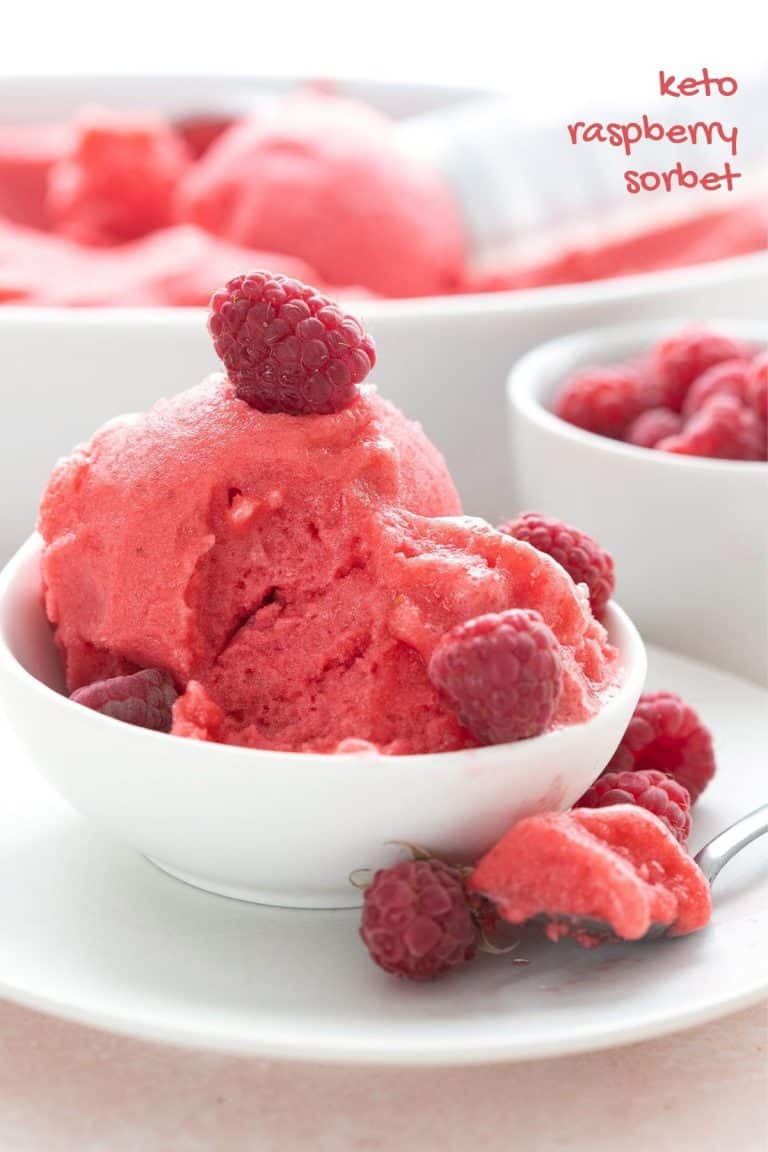












Can you substitute powdered BochaSweet in your recipes that call for granular BochaSweet? If yes, would it measure the same? Powdered is all we can get in Canada right now.
yes, it should be fine.
I noticed most of your recipes call for Swerve. I have always used a copycat version of THM Gentle Sweet. How does this compare? Are there certain recipes that I shouldn’t use gentle sweet in?
If Gentle sweet contains any xylitol (which I think it does), then it’s not a great replacement if you want crisp cookies.
What about savory sauces..like making teriyaki or glazes which sweetener do you recommend please?
As with any sauce, if you don’t want it to re-crystallize, you need a sweetener that won’t…
You didn’t mention Sweet & Low. Would this be ok for keto baking?
I only use natural sweeteners so no, I think it would be terrible in baking. 🙂
I love your website, you really do have great recipes that always turn out for me.
I have a favorite recipe that my mom used to make. It is egg whites, ground almons, lemon juice, cinnamon and sugar. They are a rolled cooky that is sipped in sugar before baking. I tried making them with the Monk fruit/erithritol sugar and they are so crumbly I can’t roll them out at all. What sugar do you suggest? Thanks so much!
I wish I could envision them… do you have a link?
Carolyn- What are your thoughts on Truvia? It is erythritol blended with chicory root fiber and stevia. I often see it on sale at the grocery store but I’m unsure of the effects of the chicory root fiber…
Thanks!
It’s fine but some people do have issues with chicory (I don’t). But it’s also often 2x as sweet as sugar so you only use half as much, which can affect the results depending on what recipe it is. They may have changed their formula but if it indicates that you only use half as much as you would for sugar, that’s your giveaway.
Fantastic review – thank you SO much for sharing your knowledge in this area ! Very helpful for newbies.
Hi! I am so in awe of all your work! Thank you!!!
Question – any suggestions for substitutions for the Erythritol? The GI issues are prohibitive in any amount.
Well, that’s kind of the point of this article… that yes, you can sub other sweeteners but you just won’t get the same results. So substitute at your own risk. Sorry…
My sister & I are exactly the same way! We cannot tolerate erythritol, can hardly use any sugar alcohols & we can’t stand the taste of stevia. I’ve spent so much money on them! I have ended up by trial & error using the consentrated versions of sucralose, monk fruit & saccharine as they at least don’t have all of the bad fillers such as dextrose & other “oses”. You can find them on Amazon. I use a combo of liquid pure sucralose (just a few drops works) & powdered pure saccharine (necta sweet…takes less than 1/4 tsp!) in most all of my baking so they’re MUCH less expensive to use. I add whipping cream to get the volume needed in many recipes such as cream cheese frosting. Perfect for cakes, cheesecakes, muffins, pancakes…not great for crisp cookies but that’s ok.
Hi Carolyn,
What is your take on a blend of Allulose and (pure) Monkfruit? Would this combination cover most ground, that is, less GI stress, balance sweetness, minimize aftertaste of monk fruit?
And for keto recipes, would you recommend using some regular sugar (within limits) and supplement with allulose and monk fruit?
Thank you! Your website is a great resource!
Well, I can’t say how it will taste but it will be mostly allulose, since monk fruit is so highly concentrated. Just like erythritol, allulose is only 70% as sweet as sugar, so the monk fruit simply makes it TASTE sweeter. So it won’t necessarily eliminate GI distress if you experience that with allulose, and it won’t allow for crispness in cookies.
Sorry, I never recommend using real sugar for keto… but you do as you see fit! 🙂
This is a MOST helpful article – answered a lot of questions about all the no sugar substitues now availalble, THANK YOU!
Welcome!
Thanks so much for this.
I’ve gotten so that almost all I use is Bochasweet, granulated and powdered, unless it’s something that I know will taste okay with a different sweetener or combination of sweeteners. It’s not as expensive if you buy it straight from the company. I’ve paid similar amounts for allulose and monkfruit (blend).
I hate the cooling effect of erythritol so I don’t use Swerve or monkfruit very often. Allulose tastes bitter, as does Stevia. I have a dog so xylitol is a no-no. I’m tired of wasting ingredients by experimenting to try to make an edible dessert.
You do a great job combining the sweeteners in your desserts. I didn’t even taste the erythritol in the coconut cream pie. So thanks for the great recipes and for this guide.
Hi Carolyn,
Thank you for all the receipes and information you provide! Just wondering if you have a brand recommendation for a liquid sweetner. Also, is there a taste difference between monkfruit based or stevia based liquid sweetners?
I have felt very frustrated trying to find a sweetener that allows for me to make jams and fruit syrups, that also work as a preservative as sugar does. As I live surrounded by fresh fruit and berries, I would like to do some preserving of fruit.
Allulose.
I have always been a fan of Gentle sweet. I make my own copy cat. I realize this isn’t good for everything because of bulk etc., so what types of desserts would you absolutely not use this for?
Thanks! I love all your recipes.
What is coconut sugar good for?Tks
Coconut sugar isn’t keto, therefore it’s not on this list.
All of your cookie recipes I’ve tried are so good, but I cannot get passed the cooling effect of erythritol. Am I understanding correctly that it is the only sugar sub that helps with crispy cookies? I also just discovered that the brown sugar Swerve has a more powerful cooling sensation than the granular. Can I use the Yacon syrup to darken up the granular Swerve, or just use all granular in place of the brown sugar Swerve? The specific recipe is the White Chocolate Macadamia Cookies.
Swerve isn’t the only sweetener that will crisp cookies… it’s erythritol. So technically any erythritol based sweetener (as long as it has no allulose or BochaSweet) should produce crisp cookies. Hard to say without trying them all. The problem is that you may also experience cooling with them. I do with plain erythritol but not at all with Swerve so you may need to try a few out.
I want to thank you for all your great recipes and helpful tips on how to choose the right sugar etc….
Welcome!
I noticed you didn’t mention sucralose (splenda) at all. Does that mean it isn’t good for baking or you just hadn’t used it that way before?
I started keto recently and was considering using it to try to make a pie soon since I already have some and wondered how it would do.
1. It’s a man-made chemical, not a natural sweetener. 2. It bakes like crap (sorry… but true!).
Have you any thoughts on coconut nectar?
It’s not very keto-friendly so I don’t recommend it.
Is there a brand of “real” monk fruit sweetener that you recommend? I use Lakanto, but as you mentioned, that’s really just erithrytol.
No, none that I recommend specifically. I don’t use straight monk fruit as it has a very overpowering aftertaste for me.
Which sweetener would you recommend for keto cheesecake? I find mine always ends up with a gritty instead of smooth texture.
Powdered Swerve.